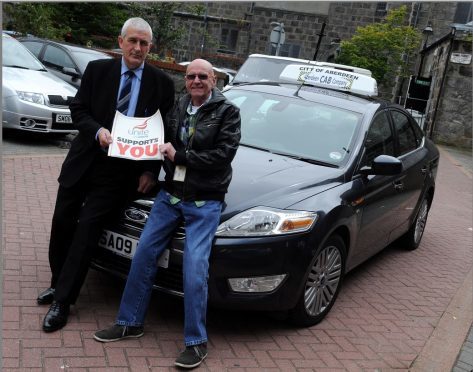The worried wife of an Aberdeen taxi driver has warned cabbies could be unable to keep working if controversial plans to make all vehicles wheelchair-accessible are adopted.
Aberdeen City Council wants all hackney drivers to make their vehicles wheelchair accessible by next year.
Union Unite has argued there is already enough provision, while others have argued that not everyone with a disability uses a wheelchair so the policy could discriminate against those with other mobility issues.
And last night Maureen Smith said the new rules could cost her husband Stuart more than £20,000 to switch from his saloon vehicle to a new wheelchair accessible type.
Mr Smith, 63, is saving for retirement after 35 years behind the wheel but could be forced to work for many more years according to his wife.
She said: “The cost of a second hand wheelchair accessible car can be as much as £22,000.
“If every taxi has to be wheelchair accessible then why not every toilet? Where does it all end?
“Everyone is suffering now with the oil crash so I don’t know why they would do this when it could put lots of people out of work.”
Taxi driver union Unite has claimed there is already sufficient wheelchair provision in the Granite City, with more than 500 vehicles equipped for wheelchair users.
After a stormy debate at the last meeting of the licensing committee, SNP councillor Michael Hutchison pushed for a motion to investigate the operations of the Dundee trade which operates with a “mixed fleet”.
The future of taxi provision will be decided by all councillors at a meeting of the full council on May 11.
Mr Hutchison said: “In my view we need a mixed fleet because we have a mixed population.
“I think anyone with concerns about this should get in touch with their councillors and let them know before the vote.”
But licensing convener Scott Carle said that the authority could be left open to legal action if they do not implement the national policy.
He said: “We have to follow the advice given to us by our legal options.
“We’ve been told that by not implementing the policy we could be in breach of our equality duties.”
